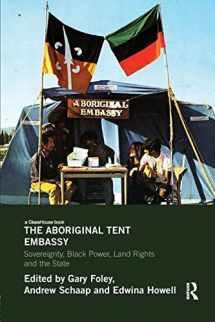
The Aboriginal Tent Embassy: Sovereignty, Black Power, Land Rights and the State
ISBN-13:
9780415839518
ISBN-10:
0415839513
Edition:
1
Author:
Gary Foley, Andrew Schaap, Edwina Howell
Publication date:
2016
Publisher:
Routledge
Format:
Paperback
328 pages
Category:
Indigenous Peoples
,
Administrative Law
,
Property
,
Business Law
,
Jurisprudence
,
Legal Theory & Systems
,
Law Specialties
,
Cultural
,
Anthropology
FREE US shipping
Book details
ISBN-13:
9780415839518
ISBN-10:
0415839513
Edition:
1
Author:
Gary Foley, Andrew Schaap, Edwina Howell
Publication date:
2016
Publisher:
Routledge
Format:
Paperback
328 pages
Category:
Indigenous Peoples
,
Administrative Law
,
Property
,
Business Law
,
Jurisprudence
,
Legal Theory & Systems
,
Law Specialties
,
Cultural
,
Anthropology
Summary
The Aboriginal Tent Embassy: Sovereignty, Black Power, Land Rights and the State (ISBN-13: 9780415839518 and ISBN-10: 0415839513), written by authors
Gary Foley, Andrew Schaap, Edwina Howell, was published by Routledge in 2016.
With an overall rating of 4.2 stars, it's a notable title among other
Indigenous Peoples
(Administrative Law, Property, Business Law, Jurisprudence, Legal Theory & Systems, Law Specialties, Cultural, Anthropology) books. You can easily purchase or rent The Aboriginal Tent Embassy: Sovereignty, Black Power, Land Rights and the State (Paperback) from BooksRun,
along with many other new and used
Indigenous Peoples
books
and textbooks.
And, if you're looking to sell your copy, our current buyback offer is $0.3.
Description
The Aboriginal Tent Embassy was established in Canberra in January 1972, when four Aboriginal activists drove from Sydney to Canberra, planted a beach umbrella on the lawns across the road from the Commonwealth Parliament House, and called it an Embassy. They were responding to a speech by conservative Prime Minister William McMahon in which he rejected Aboriginal land rights and reaffirmed the government’s commitment to a policy of assimilation. The protestors declared that McMahon's statement effectively relegated indigenous people to the status of ‘aliens in our own land’, thus as aliens ‘we would have an embassy of our own’. The brilliant idea of pitching a Tent Embassy hijacked all the symbolic 'national significance' attached to this small patch of grass by the Australian state and media, and put it to work for radically different purposes. It enacted the kind of land rights that the activists were seeking, and it did so in a way that also drew attention to the living conditions of so many Aboriginal people across Australia. On its twentieth anniversary, the Embassy was permanently established, as part of an on-going struggle for recognition of Aboriginal land rights and sovereignty. It remains today, and celebrates its fortieth anniversary in 2012. This book draws together contributions from an interdisciplinary group of Aboriginal and non-Aboriginal scholar, some of whom were participants in the events that they write about, to examine the social, historical and political significance of the Aboriginal Tent Embassy for Australian society and for the struggle for indigenous rights internationally.


We would LOVE it if you could help us and other readers by reviewing the book
Book review

Congratulations! We have received your book review.
{user}
{createdAt}
by {truncated_author}


